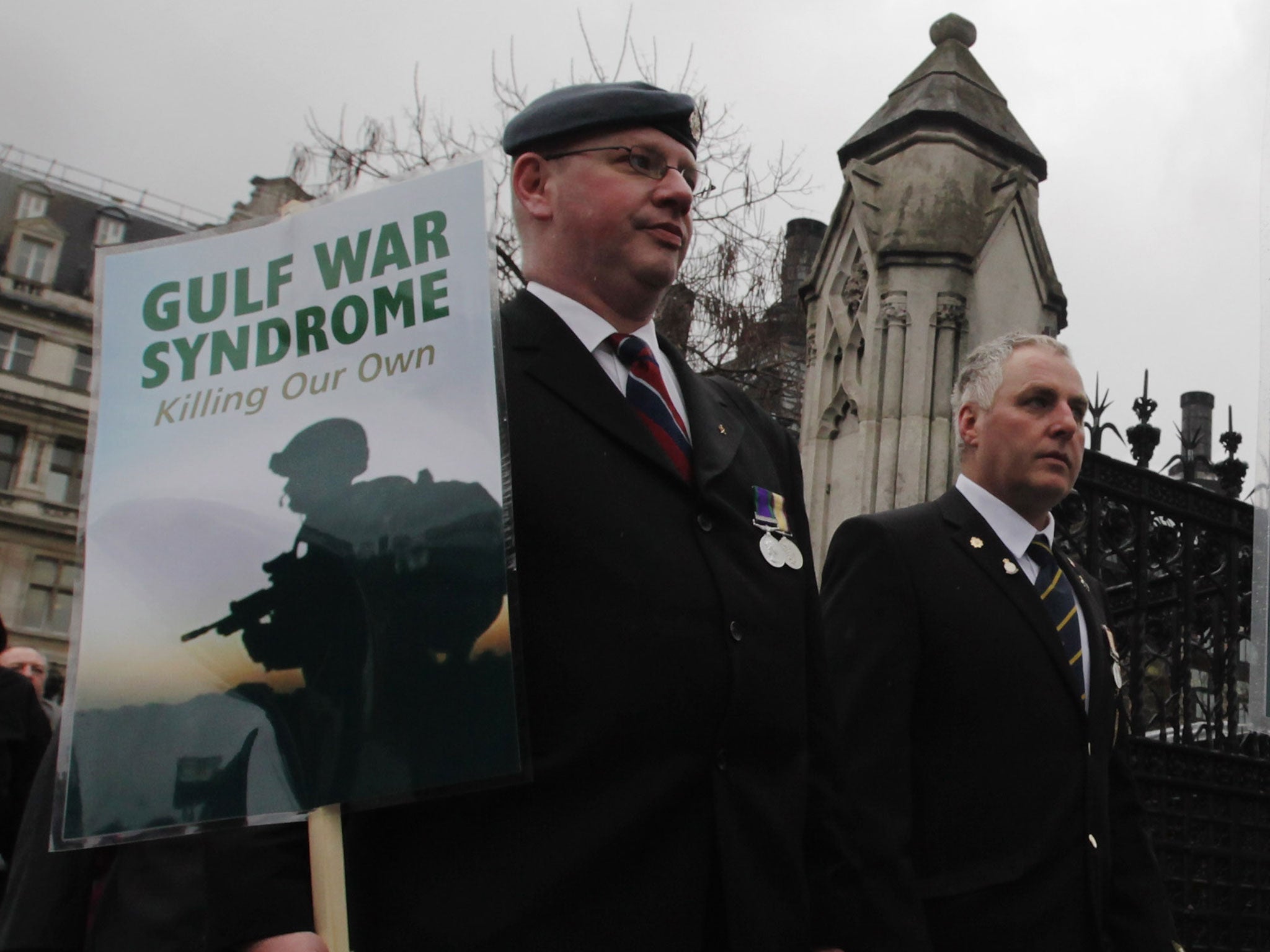Mystery of Gulf War Syndrome ‘solved’ after veterans left battling pain and memory loss
Researchers say sarin to blame for illness

Researchers in the US claim to have solved the mystery of Gulf War Syndrome, an illness suffered by thousands of American and British veterans.
The soldiers developed chronic symptoms including fatigue, headaches, joint pain and respiratory disorders after fighting against Saddam Hussein’s troops in the First Gulf War.
For years the cause of their ailments was disputed. But now a study, which was partly funded by the US government, says it has found strong evidence that sarin - a type of nerve gas - was to blame.
After the war broke out following Iraq’s invasion of Kuwait, western forces bombed Iraqi chemical weapons caches containing sarin, releasing harmful gases into the air.
Although Sarin is usually deadly, ground troops were not killed because the gas was diluted as it spread, according to Dr Robert Haley, a genetic epidemiologist from the University of Texas Southwestern Medical Center who co-authored the study.
Prof Haley and his team examined more than 1,000 US veterans who had fought in the war, half of whom suffer from the illness.
They looked at two different versions of a gene called PON1, whose Q variant creates a blood enzyme used to break down sarin, but whose R variant is not effective at destroying the nerve agent.
People carry two copies of the gene, meaning QQ, RR or QR are the possible genotypes. The scientists found that those with QQ genotype had the lowest chance of developing the syndrome, while those with the RR genotype were the most likely to get the disease.
The study’s authors argue that this finding proves that sarin was largely responsible for the syndrome, as those with the RR genotype, the one which is least able to inactivate sarin, were the most affected by the disease.
“Quite simply, our findings prove that Gulf War illness was caused by sarin, which was released when we bombed Iraqi chemical weapons storage and production facilities,” said Prof Haley, who has studied the syndrome for 28 years.
“There are still more than 100,000 Gulf War veterans who are not getting help for this illness and our hope is that these findings will accelerate the search for better treatment,” he said.
Evidence pointing to sarin as the cause of the disease came as early as 1995, he said, adding that “it has taken many years to build an irrefutable case”.
Last year, a study conducted by the University of Portsmouth rejected the argument that depleted uranium had made the troops ill.
Speaking at the time, Professor Randall Parrish, who led the research, said: “The plausibility of the link between depleted uranium and the illness has bubbled along now for nearly 30 years, but we would argue it’s time to look elsewhere.” He suggested the most likely cause for the illness was exposure to sarin.
There could be up to 33,000 Gulf War syndrome sufferers in the UK, more than half of all the British troops deployed to the Middle East for the war, according to the Royal British Legion.
One of them is Kerry Fuller, from the West Midlands, who was very active before his illness. The 58-year-old told the BBC he now has severe joint and muscle pain, and struggles to get out of bed.
"Even when I was still in the military, I was getting illness after illness, breathing problems, chronic fatigue," he said.
"And when I questioned whether it could be anything to do with my service in the Gulf or what we were exposed to, the military line was ‘You’re talking nonsense, there’s no evidence. Two paracetamol. Crack on’."
The National Gulf Veterans and Families Association, a British charity, expressed hope that the new US study, which was published in the Environmental Health Perspectives journal, could be a turning-point for those affected by the disease.
“Gulf War veterans have been suffering for many years with no explanation of why they were so badly affected by serving in the Gulf War,” it said in a statement.
“For the survivors, at last they may find hope and optimism. We hope the UK government takes this report on board and will respond by offering Gulf Veterans access/opportunity to have the tests.
“This will hopefully lead to more meaningful and proper medical treatment which they have for too long been denied.”



Join our commenting forum
Join thought-provoking conversations, follow other Independent readers and see their replies
Comments